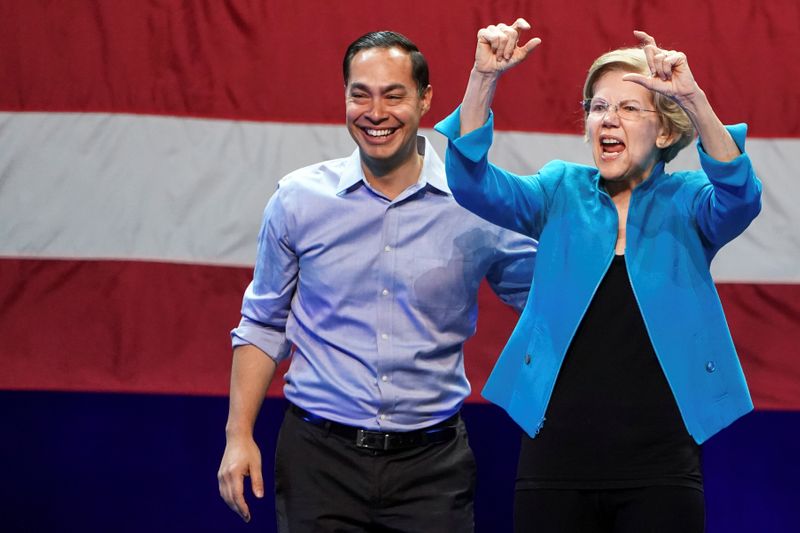By Joseph Ax
NEW YORK (Reuters) - Democratic White House hopeful Elizabeth Warren rallied a raucous crowd of thousands in New York City on Tuesday alongside former rival Julian Castro, whose endorsement a day earlier could boost her candidacy at a critical moment in the campaign.
Castro, a former U.S. housing and urban development secretary under President Barack Obama, told the crowd about having lunch with Warren, a U.S. senator from Massachusetts, early in his tenure, and expecting to engage in some small talk to get to know one another.
"Boy, was I in for a rude awakening," he said to laughter. "She wasn't there for small talk. She was there to learn what I was going to do to make sure more people could stay in their homes."
There are 14 Democrats seeking to take on Republican U.S. President Donald Trump in the November 2020 election.
Warren remains near the top of the field but has seen her poll numbers stall in recent months. She currently trails former Vice President Joe Biden and fellow liberal U.S. Senator Bernie Sanders.
She will travel this weekend to Iowa, which holds the first nominating contest in early February. Castro, who was the only Latino candidate in the Democratic presidential field, will join her on the campaign trail on Sunday.
In a 40-minute speech on Tuesday, Warren echoed the theme at the core of her campaign: The government has been corrupted by money to favor corporations and the wealthy over working families. She touted her plans for a wealth tax, major new restrictions on lobbying and renewed enforcement of antitrust laws to break up massive companies – drawing a chant of "break them up" from the crowd.
Warren also mocked unnamed billionaires for "crying" on television about her proposed wealth tax and noted that others had decided to run for president, a clear reference to former New York City Mayor Michael Bloomberg, who jumped into the Democratic race in November. The crowd of Brooklynites responded with boos for their former mayor.
Before launching her stump speech, Warren called on the Trump administration to reduce tensions with Iran, shortly after Tehran launched missile attacks against U.S.-led forces in Iraq.
"This is a reminder why we need to de-escalate tension in the Middle East," she said. "The American people do not want a war with Iran."

The Iranian attacks were in retaliation for a U.S. drone strike last Friday that killed Qassem Soleimani, a top Iranian commander whose death has ignited fears of a broader conflict.